News in brief
21 May 2010
Diploma in Innovation Management moves to the Australian School of Business
The Diploma in Innovation Management has been approved to be transferred to the Australian School of Business and be offered to all UNSW faculties. Read more...
27 November 2009
Fantastic Achievements for the EIS Unit in 2009
As usual, the high standard of the EIS Unit was kept this year across a number of activities over the year. Read more...
19 December 2008
Success all round for the EIS Unit in 2008
2007 was a tough year to beat and students of the EIS Unit didn’t disappoint this year with numerous awards being won and successful programs being run. Read more...
10 March 2008
Another top year for students of the UNSW Entrepreneurs in Science Unit
2007 turned out to be another successful year for UNSW Diploma in Innovation Management students. Winning numerous awards and receiving significant recognition for their efforts, these students made 2007 a hard year to beat! Read more...
11 January 2007
Australian Chief Scientist addresses UNSW Diploma students
Thursday December 14, 2006: Dr Jim Peacock, the Australian
Chief Scientist talked to UNSW’s Diploma in Innovation Management
students and alumni. Read more...
18 December 2006
Practise what you preach...
Dr Wallace Bridge believes that if you are to teach commercialisation
and entrepreneurship you should really practise what you teach because
practise shows you what to teach. Read more...
8 December 2006
New body armour gives Diploma students the edge to defeat
AGSM and MGSM students in the 2006 Peter Farrell Challenge Cup
Diploma in Innovation Management students have gone and done it
again by winning the AGSM’s annual Business Planning Competition
for the 4th year in a row. Read more...
13 November 2006
UNSW’s Brillyance shines at the NSW Young Achievement
Australia Awards
UNSW’s Diploma in Innovation Management students have once
again excelled in the Young Achievement Australia’s (YAA)
business skills program. Read more...
29 November 2005
Science Students Blitz Business Planning Competition, Again
Science students from UNSW sold a high-powered industry panel on
a plan to culture sea urchins for the Japanese market. They earned
$5,000 by winning. Classmates took out second and third place at
the 2005 AGSM Connector Business Planning Competition last week.
Read more...
14 November 2005
Entrepreneurial Science Students Prove Themselves Unswayable
The state’s outstanding young entrepreneurial talent was recognised
at the 2005 Young Achievement Australia NSW awards evening on Thursday
10th November at the Roundhouse, University of New South Wales.
A team of students in UNSW’s unique science entrepreneurship
program were among those honoured. Read more...
10 December 2004
Innovative scientists win AGSM business planning competition
Science students scooped the pool at the 2004 Connector Business
Planning Competition last Friday, taking out first and equal second
place. Read more...
21 May 2004
GIVING SCIENTISTS A HEAD FOR BUSINESS
On Friday 14 May, 2004 the very first group of University of NSW
students trained with skills necessary for the commercialization
of Australia's scientific discoveries will graduate with a new diploma
- in effect, business studies tailored for the scientist. Read
more...
12 December 2003
Science scoops pool at AGSM Business Planning Competition
Science students have scooped the pool at this year's Connector
Business Planning Competition, walking away with over $7,000 in
cash and prizes. Read more...
News in detail
21 May 2010
Diploma in Innovation Management moves to the Australian School of Business
The Diploma in Innovation Management has been approved to be transferred to the Australian School of Business and be offered to all UNSW faculties.
The Diploma in Innovation Management (Dip.Innov.Man) has now been approved to be offered across UNSW! Previously only available to Faculty of Science students, it has now been recognised as of paramount importance to the professional skill-set required of UNSW graduates across every discipline. The Diploma in Innovation Management from now on will be administered by the Australian School of Business (ASB), here at UNSW and will be offered to all Faculties.
This has been a focus of the Entrepreneurs in Science Unit’s efforts of late and also a vision of its founder, Dr Wallace Bridge.
“This is a logical and beneficial step for commercialisation and innovation management education training for all involved here at UNSW. It will be pivotal in helping shape UNSW graduates as those optimally trained for the vast array of jobs present today and in the future”, said Dr Bridge.
The Diploma in Innovation Management will be housed within the ASB, specifically the School of Strategy and Entrepreneurship, in cooperation with the Entrepreneurs in Science Unit and supported by the Centre for Innovation and Entrepreneurship (as shown by the below structure).
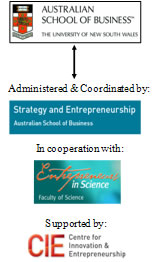 The Diploma will be under the direction of Dr Martin Bliemel, a Lecturer in Innovation and Entrepreneurship. He joined the School of Strategy and Entrepreneurship at the Australian School of Business from Simon Fraser University in Vancouver, Canada. His research is on the use and development of entrepreneurial networks. Prior to his PhD he worked as a mechanical engineer in one of Canada’s 50 Best Managed companies, completed his MBA at Queen’s University and started his own business consulting company to help entrepreneurs with market research, financial modelling, business plans and raising capital. For 5 years, he was also a mentor with New Ventures Business Competition and a presentation room manager at the Angel Forum. A worthy fit to champion the expansion of the Diploma and see it be an even greater force in commercialisation education for UNSW. The Diploma will be under the direction of Dr Martin Bliemel, a Lecturer in Innovation and Entrepreneurship. He joined the School of Strategy and Entrepreneurship at the Australian School of Business from Simon Fraser University in Vancouver, Canada. His research is on the use and development of entrepreneurial networks. Prior to his PhD he worked as a mechanical engineer in one of Canada’s 50 Best Managed companies, completed his MBA at Queen’s University and started his own business consulting company to help entrepreneurs with market research, financial modelling, business plans and raising capital. For 5 years, he was also a mentor with New Ventures Business Competition and a presentation room manager at the Angel Forum. A worthy fit to champion the expansion of the Diploma and see it be an even greater force in commercialisation education for UNSW.
“I’m looking forward to bringing together UNSW students and equipping them with the skills to be able to understand, develop and capitalise on the myriad technological opportunities being developed locally and around the world”, said Dr Bliemel.
Students from every faculty at UNSW will be eligible to enroll in the Diploma in their second year and are required to undertake 36 units of credit (the equivalent of 6 full-time subjects) concurrently to their Bachelor degree to be eligible for the Diploma. It will be the first program of its kind that brings all faculties under the one program to be able to study Innovation Management. The first intake of students under the new structure will begin in 2011.
For more information, please visit the Future Students section.
27 November 2009
Fantastic Achievements for the EIS Unit in 2009
As usual, the high standard of the EIS Unit was kept this year across a number of activities over the year.
Graduate Certificate and Diploma Success in the Peter Farrell Challenge Cup
Three EIS teams placed 2nd, 5th, and a finalist in the AGSM’s 2009 Peter Farrell Challenge Cup business planning competition - a fantastic result by all involved! The final pitches/dinner was held at the Scientia on Thurs 19th November. A staggering 54 business plans entered into the competition this year, with entries coming from across UNSW and from USyd and Macquarie. Eight teams made the finals – a fantastic effort by the three EIS teams.
Students from both EIS programs, the undergraduate Diploma and Graduate Certificate are required to prepare a business plan in their capstone subjects (subject BIOT3091 and STRE6030 for the Diploma and Graduate Certificate, respectively).
Mercurius Ltd. (Graduate Certificate students: Lee-Nuang Sim, Yuan Wang, Jingjing You) won 2nd place and $2500 with their hardware/software solution for optimising filtration membrane maintenance and replacement in desalination plants.
Wildcard Technologies (Diploma students: Tara Francis, Christopher Hutton, Jake Weragoda and Marc Barker) took out 5th place and $250 for their opportunity of a wi-fi paperless receipt system for small business management of GST and expenses.
Viva Blu (Diploma students: Keith Friedlander, Simon Gilmore, Ben Lewis and Alicia Yurka) took a finalist place (after a contentious decision, which could have seen them walk away with first place). Their opportunity surrounded a chemical-free, low cost and energy effective water-purification technology using a photocatalysis reaction.
The three member Graduate Certificate team (being sponsored by the Federal Government, Commercialising Technology Scheme) took out a well deserved 2nd place! Despite the disadvantage of all three girls speaking English as a second language and having reasonably strong Chinese accents, they gave a brilliant and well drilled pitch that clearly described their business proposition. They adeptly handled all the judge’s questions, and their strong performance was the subject of many discussions during the pre-dinner drink session on the Scientia balcony.
The Director of EIS and the Graduate Certificate’s founder and Program Authority, Dr Wallace Bridge was beaming:
“I believe their success in this competition is testament to the value of the CTS program. The business plan was a culmination of their Graduate Certificate and they brought all aspects together - I am very delighted with their success and proud of their performance.”
Dr Bridge was also able to pass the torch as he presented the Faculty Entrepreneur of Year Award to the more than well deserved recipient, Hamish Hawthorn (CEO ATP Innovations and EIS Visiting Fellow).
More information about the Peter Farrell Cup can be found at http://ice.agsm.com.au.
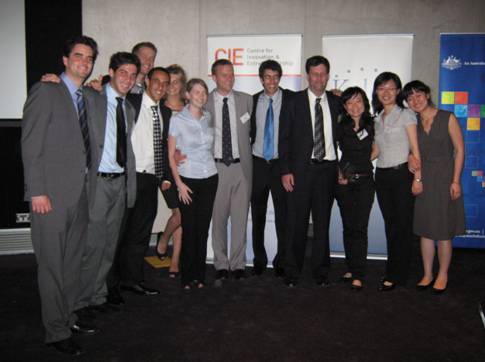
Due to overwhelming success over the years by EIS students, it is with great pleasure that we have decided to establish an Honour Roll in recognition of their achievements -- a big congratulations to all! Click here to see the PFC Honour Roll
Nothing was un-masked for the EISSOC-BABSOC Ball in 2009!
The 2009 calendar was a great success for EISSOC-BABSOC, despite a short 12-week semester. Again the highlight event of the year that was most talked about was the Annual Ball. This year’s Ball, with a Masquerade theme, was held at Darling Harbour at The Star Room in the IMAX building. Over a 120 people attended with their best mask and a fantastic night of food, drink, and dancing was had by all.
In light of the global financial crisis, sponsorship money was scarce at best for EISSOC-BABSOC. This only strengthened the resolve of BABSOC (and it’s President Marc Barker), which secured $1000 from Crown Scientific and $750 from ResMed – truly a great effort! In addition to this, sponsorship was secured through competing for competitive Arc Student Society Grants. This met expenses for all the events throughout the year, where Arc members (a proportion of BABS students) were involved.
Events in 2009 involved participating in and hosting the Meet the Entrepreneur Event (Titled ‘The Biotech Way’). This was held in conjunction with the Australian School of Business (ASB) and the Centre for Innovation and Entrepreneurship (CIE). This saw distinguished Biotech professionals discuss their careers with students. A series of BBQs were also hosted by BABSOC to enhance interactions between senior staff and students.
A source of positive feedback from the participating students involved two Careers Nights organised by BABSOC. One focused on the recent graduates sharing their experience and passing on wisdom, with the second focused on employers and what they see in potential graduates – a positive experience for all involved.
Have a look at societies' website www.bioinnovation.org.au for photos and more information.
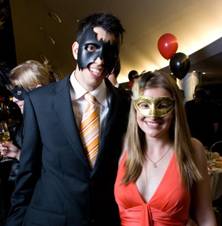 
EIS Diploma students put their theory into practice!
In a change of tact for the EIS Diploma students, the company group (titled, Recombinant Bean) for the Diploma undertook a feasibility analysis and construction of a business plan for a coffee cart within the School of BABS instead of the YAA program. This was to meet a need for increased social networking and school social cohesion in the School of BABS – a perfect job for Diploma students!
The coffee cart concept was to be a not-for-profit BABS student-run coffee club, located in the Samuels Building here at UNSW. Recombinant Bean’s aim was to provide a collegiate environment for both academics and students, delivering inexpensive quality espresso coffee to encourage networking between students and staff.
A full business plan was drawn up and the concept pitched to the BABS Executive team. All their training and hard work paid off with the proposal accepted and its implementation to be in the latter half of 2010.
The result was welcomed by mentors, Wallace Bridge and Tim Ellis:
“They did a fantastic job and it didn’t come as a big surprise as they were ideally trained for the feasibility analysis. The education from the Diploma placed them well for success in this project”, said Assistant Director, Tim Ellis.
Stay tuned for more information relating to the Recombinant Bean coffee cart.
19
December 2008
Success all round for the EIS Unit in 2008
2007 was a tough year to beat and students of the EIS Unit didn’t disappoint this year with numerous awards being won and successful programs being run.
More Diploma Success in the Peter Farrell Challenge Cup
Entrepreneurs in Science students have once again proved their worth in the 2008 Peter Farrell Challenge Cup business planning completion, with Diploma teams taking out 2nd, 3rd, 4th, 5th and the Social Endeavour Award. First place was taken out by an MBA lead team and was the AGSM’s first win in over 5 years (having been taken out by Diploma students previously).
Students from both EIS programs, the undergraduate Diploma and Graduate Certificate are required to prepare a business plan in their capstone subjects.
Of the eight finalists selected from the 45 entries submitted to the competition, there was one MBA team, five Diploma teams (subject BIOT3091), and two Graduate Certificate (subject STRE6030). This was the first year our Graduate Certificate PhD students had competed in the competition – and to have two teams make the finals was an excellent result.
Total prize money in cash alone won from Diploma students competing in the competition (since 2003) is now up to a staggering $65,500 and total prize value is well over $100,000!
The Diploma teams developed business plans over the course of session 2 on opportunities and intellectual property (IP) either sourced by themselves or provided by Peter Milla of Business Tree Pty Ltd. Peter is a COMET advisor consultant with AusIndustry, and he and his colleagues are regular guest lecturers in both our teaching programs. The Graduate Certificate teams are encouraged to develop business plans based on opportunities arising from their own PhD research findings or from their research group or organisation.
On the finals night held on Thursday 13 November in the Scientia, the finalists were given 20 minutes to pitch their plans and address questions from a panel of seven expert judges, including; venture capitalists, business managers, entrepreneurs, business academics, and IP professionals.
The winning team, FML recruitment (made up of four MBA students) took out the $5000 cash prize with a business model for an innovative online recruitment company.
On Water Marine (Diploma students; Harsha Krishnakumar, Jason Woodhouse, Theo Orfanos, Ivan Wong, and Alex Braude) won 2nd place and $2500 with their business model to commercialise a patented environmentally friendly boat mooring design, which effectively overcomes the extensive damage to sea-grass that occurs with current systems.
E-Par (Diploma students; Reg Leones, Adeline Lukmantara, and Yan Yee Poon, Biotech student; Danyal Butt) took out 3rd place, $1000 and also won the Social Endeavour Award (resulting in another $1000) for their environmental management system for golf courses. The software and service allows golf courses to optimise their maintenance costs, reduce environmental impacts, with the added benefit of offering additional revenue to course operators through carbon credit trading.
Fourth place ($750) went to Trace Optics (Diploma students; Sandy Thai, Patrick Phan, Mareney Ithanpanya, and Carolyn Ly) for their plan for commercialising a precision camera system (software and hardware) which offers more accurate "following of the action" at sporting events (e.g. horse racing and football sports).
Fifth place ($250) was won by MobbiExpress (Diploma student; Sze Wuen Ong, and Biotech students; Cherry Fung, Bryan Ho, and William Choo). Their plan was based on a new payment gateway technology platform that allows small business operators to securely process credit card payments using a smart phone, whilst on the road.
The three other EIS teams which made the finals were:
Bizexpress (Diploma students; Ivan Yeung, Jane Chan, Brian Wong, and Rebecca Paget) with their plan for a software system that solved a common problem for buying groups (e.g. franchises) – the need to prepare outlet specific catalogue brochures without risking damage to the buying group brand.
FlowSolver (Graduate Certificate students; Kai Wei Chu and Andrew See, MBA student; Sidney Hsiong); FlowSolver’s solid-fluid simulation software developed by Kai Wai and his PhD supervisor offers the mining, chemical, power and pharmaceutical industries an alternative to traditional high cost physical experimentation for the design and optimisation of production plant.
SHAPE Ltd. (Graduate Certificate students; Helen McGuire and Nadim Naser). SHAPE’s plan was to establish a Website to house a Fracture Risk Calculator developed by the Garvan Institute of Medical Research following decades of clinical research. The calculator using simple personal physical and medical inputs can predict the risk of an individual suffering a bone fracture due to osteoporosis with the next 0-10 years. Revenue would be generated from advertising sponsorship from companies offering ethical products to reduce this risk.
This year an “Honourable Mentions” category was included for the next eight business plans judged to have been well prepared and worthy of praise. Four of our undergraduate BIOT3091 teams achieved this, namely Dynamic Technologies: on track (Jeremy Provan, Matthew Nguyen, Nathan Dunn, and Jasper Ashley) - diabetes type 1 self management software system, KnowBallyhoo (Kirsten Coupland, Andrew Madry, Leena Najeeb, and Krisandra Jahja) - Internet based law precedent supplier, RPM Rural Business: The brand for the man on the land (Yu Xi Zhang, Natasha Kaminski, and Martin Tanudjaja) – Species recognition software/hardware systems for rural gate control, and Wavefront Biometric Technologies (Christian Willnersson-Thoern, Vineet Minhas, Maria Sola Gil, and Jacob Coffey) – cornea based biometric software/camera system for security control.
Congratulations to all the teams that competed in the competition and performed so well – we are very proud of your achievements in becoming competent in the business world. Also special thanks to our EIS Adjunct Fellows Hamish Hawthorne (ATP Innovations) and Maurice Chiarella (Stannard Marine) for their on-going invaluable contributions to teaching our students accounting, finance, strategy and valuation throughout both programs. To Peter Milla, Peter Gow (Creative Capital) and Barry Anderson, thanks heaps for your continued enthusiasm in providing opportunities for the students and teaching the realities of business. We are totally dependent on our army of external working professionals who year after year keenly volunteer to provide real world instruction to our students – so thanks to all of you.
More information about the Peter Farrell Cup can be found at http://ice.agsm.com.au.

EIS team Radiyate’s success in the Young Achievement Australia (YAA) Business Skills program
The 2008 EIS sponsored Young Achievement Australia company, Radiyate, lived up to the high expectations put on them by mentors Wallace Bridge and Tim Ellis. At the YAA state awards dinner held on 6 November, 2008 at the Bayview Boulevard Hotel in Sydney, Radiyate was nominated for nearly every award, including Annual Report, Business Plan, Outstanding Product or Service, Environmental Sustainability, Marketing, and Media ...truly a great effort!
Keith Friedlander was also a finalist for the New South Wales Tertiary Business Person of the Year award. “Though Keith didn’t win the award on the night, he certainly would have had my vote – he did a fantastic professional job as Radiyate’s Managing Director with perfectly chaired meetings, and brilliant leadership, vision and team management”, said Wallace. A key contributor to Radiyate’s success was that every one of the team members put in maximum effort to achieve the company’s goals.
Unfortunately for Radiyate, they were up against very strong completion from Desiya (sponsored by Ernst and Young), which won six of the eight award categories being contested. Desiya ultimately went on to win the National Tertiary Company of the Year award.
Radiyate’s innovative and highly consumer focused product, ‘cable labels’ offered a simple solution to identifying specific power cords in high density electrical appliance areas, such as computer work stations and home theatres. It was one of the most successful and popular products produced by an EIS sponsored team; selling over 800 products and generating an astounding 6x return to shareholders!
“We realised at a very early stage that we were onto a real winner of a product. Initial market research showed a promising outlook for the acceptance of our product. The ominous current economic climate has started shifting consumer expenditure from discretionary spending, towards needs such as problem-solving products and we believed our product did just that” said Keith
Radiyate was staffed by fifteen Diploma students concurrently undertaking BSc degrees majoring in diverse areas such as nanotechnology, mathematics, physics, biotechnology, biochemistry, microbiology, and medical science.
During the YAA program students formulate and decide on a product, elect their executive team, raise capital, sell the product and finally liquidate the company (during which they produce a business plan and annual report). This effectively simulates a business life cycle over an eight month period.
More information on the YAA program can be found at www.yaa.org.au.
More information on Radiyate and their product can be found at http://radiyate.co.nr/

Lights, Camera, Action for EISSOC-BABSOC in 2008!
Our student societies' management teams did a fantastic job in 2008 organising heaps of great well attended events, including two careers nights, two BBQ's, and a "Meet the Entrepreneur" evening. The highlight of the year was the Annual Ball themed as a "Night with the Stars" and held on Friday 17 October at the WatersEdge, Walsh Bay, which offered spectacular Harbour views and excellent food and beverages. There were over one hundred guests including BABS/EIS current students, alumni and staff walking the red carpet - and all appeared to have a great time.
Have a look at societies' website www.bioinnovation.org.au for photos and more information.
The inaugural Meet the Entrepreneur evening was organised in collaboration with the Centre of Innovation and Entrepreneurship (Australian School of Business), and the COMSOC student society. The purpose of the event was to have our students hear from, and be inspired by, entrepreneurs and CEO's who are going through the trials and tribulations of trying to commercialise technology. This year speakers included Mr Mike Gregg (former Managing Director (MD) of Health Communication Network Ltd); Prof Duncan Veal (CEO; Fluorotechnics Pty Ltd); and Dr David Andrews (MD, MRC Biotech Pty Ltd). All the presentations were excellent, informal and interactive with lots of keen questions from the audience.
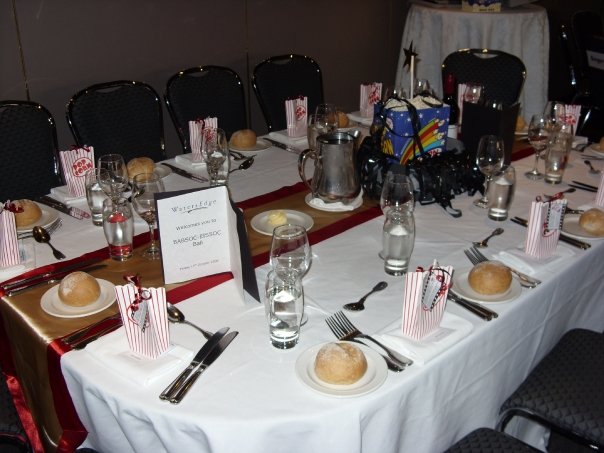
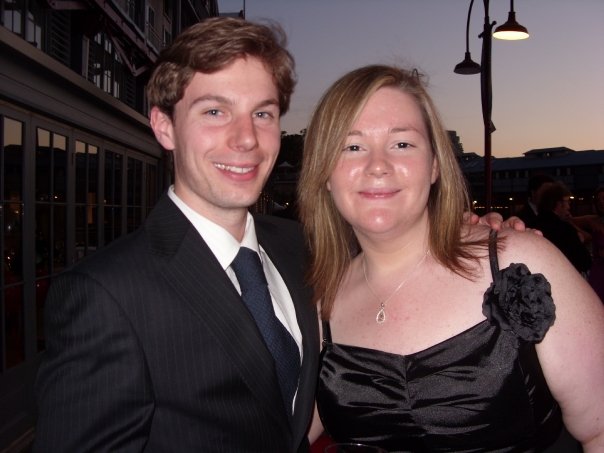
Diploma Graduates Excel!
Ausbiotech – GSK Student Excellence Awards
On 8 September, six postgraduate students from UNSW and University of Sydney delivered their "pitches" in the finals of the Ausbiotech-GSK Student Excellence Awards. The Entrepreneurs in Science Unit was well represented with Leo McHugh (Diploma in Innovation Management class of 2001), Bill Cheng (Diploma class of 2004) and Grace Chong (Graduate Certificate in Research Management and Commercialisation class of 2008).
The winner, Leo, judged by an the expert panel of technology and investment professionals was announced at the end of the evening. Leo pitched a commercialisation strategy for new software he is developing to assist in the identification of proteins in proteomic systems. The software opportunity is an outcome of his current PhD project research efforts (at the University of Sydney). Leo is a Biotechnology/Bioinformatics graduate from UNSW. This is the second year running that UNSW/Diploma students have taken out the award. Last year’s winner was Gorjana Kisa (Class of 2008), who is also a UNSW Biotechnology/Diploma Graduate.
The Ausbiotech – GSK Student Excellence Awards have been running since 2004 for students who just finished their Honours or started their PhD/Masters. The competition encourages students to strategically consider their research in a commercial setting. The winner receives all expenses (including flights and accommodation) registration to the annual AusBiotech conference.
For more information, please visit www.ausbiotech.org
Award for early career PhD Student – Helen McGuire
Another Diploma in Innovation Management graduate (class of 2003), Helen McGuire, has won the 2008 Castle Harlan award at the Garvan Institute for Medical Research. The award is given for the most outstanding early career PhD Student at the Garvan in 2008 and involves a cash prize of USD$10,000.
Helen is currently undertaking her PhD in immunology (specifically on IL-21 in Type 1 diabetes) at the Garvan and is also undertaking the Graduate Certificate in Research Management and Commercialisation (supported through a Commercialisation Training Scheme scholarship).
Helen has previously been a member of the winning team (Protogene) in the 2004 AGSM’s Connector Business Planning Competition, and this year together with fellow Graduate Certificate student, Nadim Naser, was a finalist in the AGSM’s Peter Farrell Challenge Cup. These ongoing successes are demonstrating that Helen is truly a talented scientist with a well developed commercial mindset …she’s certainly one to watch in the future!
For further information on the Castle Harlan award, visit www.garvan.org.au

It’s not just our students who get awards and recognition…the Director of the EIS Unit likes to lead by example!
Dr Wallace Bridge, Director of the Entrepreneurs in Science Unit has been awarded a prestigious 2008 Australian Learning and Teaching Council (ALTC) Citation for Outstanding Contributions to Student Learning for his efforts in successfully establishing, developing, and delivering our Diploma in Innovation Management. Dr Bridge was one of seven individuals from UNSW to receive an ALTC citation.
Since receiving the award in July 2008, two articles in leading Australian newspapers (The Australian Financial Review and The Sydney Morning Herald) have been published reporting the Entrepreneurs in Science Unit’s education programs; the Diploma and the new Graduate Certificate in Research Management and Commercialisation. The ALTC also ran a feature article on the Diploma in its October edition (posted 22 October) of its monthly newsletter Communique.
“As the ALTC had a choice of 253 national citation winners to showcase, I feel this is strong validation that the ALTC considers the UNSW Diploma model to be an exemplary example of good practice in tertiary education”, said Dr Bridge.
For further information on the ALTC Citation Award and the media reports, visit the following sites:
UNSW Media Release: www.unsw.edu.au/news/pad/articles/2008/aug/ALTC.html
ALTC Awards: www.learningandteaching.unsw.edu.au/content/LT/awards/altc_intro.cfm?ss=2#Citations
ALTC Communique Feature Article: www.altc.edu.au/carrick/webdav/site/carricksite/users/siteadmin/public/communique_oct08.pdf
Australian Financial Review Publication
Sydney Morning Herald Publication
10
March 2008
Another top year for students of the UNSW Entrepreneurs in Science Unit
2007 turned out to be another successful year for UNSW Diploma in Innovation Management students. Winning numerous awards and receiving significant recognition for their efforts, these students made 2007 a hard year to beat!
Diploma students show their Resilyance in the Young Achievement Australia program
UNSW students once again excelled in the Young Achievement Australia (YAA) program for 2007. The final NSW Awards night was held on 9 November, 2007. On the night the UNSW team, Resilyance, was nominated for numerous awards, including some of the most prestigious. The team deservedly walked away with the Baxter Healthcare Outstanding Product Award and the Baxter Healthcare Environmental Award.
Resilyance truly did have an outstanding product; though it was, at the same time, inherently challenging. They sold a unique alternative to gift cards – a message in a can.
Branded “Silver Moments”, their product gave consumers the option of a personalised card in a can, or puzzle in a can. For the puzzle option, consumers wrote their personalised message on a jigsaw puzzle of their choice (of five designs, all created by Resilyance). The puzzle was then disassembled and sealed in the can. The recipient of the message had to open the can and put together the puzzle in order to read the personal message.
Jason Woodhouse, Managing Director of Resilyance and student in the Diploma, claimed, “although ‘Silver Moments’ was an innovative product, it was also full of challenges. Our company was in many ways a service provider – it was a complex business where we needed 2 points of contact with our customers. Because the product was so unique, our marketing efforts needed to educate the target market about our product as well as selling it. I believe as a team we overcame these challenges.”
Resilyance consisted of 21 students from the UNSW Diploma in Innovation Management. These members were majoring in a variety of scientific fields including life science, biotechnology, nanotechnology and medical science.
During the YAA program students form a company, sell shares to raise capital, decide on a company name and product, elect members into specific positions in the company, prepare a business plan, manufacture and sell their products. At the end of the program participants prepare an annual report, liquidate, and distribute the capital back to the share holders (with any gains).
More information on the YAA program can be found at www.yaa.org.au.
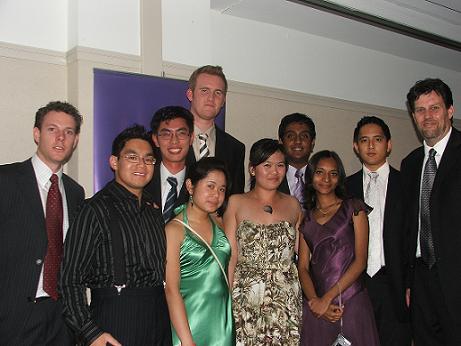
Success… again… in the Peter Farrell Cup
Entrepreneurial UNSW science students again impressed the high powered judges in the AGSM Peter Farrell Cup entrepreneurship competition. Competing with MBA students, these budding scientists walked away with 1st, 2nd, 3rd, and 5th places, including $11,000 cash and many other non-cash prizes.
Running over 3 months, teams of students were required to prepare a business plan based on a commercially viable idea. The winning UNSW teams based their business plans on technology-based innovations generously supplied by Peter Milla, an AusIndustry COMET program advisor.
The winning team, Renovo (consisting of Diploma students Stephanie Kong, Simone Li, Sam Thorp and Tim Ellis), presented an opportunity for a unique intercom system which has many advantages over existing systems.
Second and third place went to the Diploma teams, Hydrokinetics (David Gunst and Timothy Li) and Compass Business Solutions (Priya Rao, Alex Nikov, Nicolette Yeo and Jason Low) respectively. These teams presented opportunities for a thermoelectric module (the next generation of refrigeration technology) and a diagnostic tool to assist veterinary clinics appropriately treat animals.
Another Diploma team, Weedless Landscape (Jaemin Kim, Kristan Withers, and Jing Zhang), was awarded the Social Endeavour Award for their business plan for a herbicide-free weed control system.
Representatives from each of the winning teams were given the opportunity to attend the 2007 Ernst & Young Entrepreneur of the Year award ceremony in Melbourne.
Dr Wallace Bridge, Director of the Entrepreneurs in Science Unit at UNSW, was awarded the inaugural Faculty Entrepreneur Award for his dedication to educating scientists in the field of entrepreneurship and innovation.
Earlier in the year, two UNSW Diploma students, Timothy Li and David Gunst, won first place in the Peter Farrell Cup PitchFest competition. They walked away with $500 for their pitch on a biotechnology business opportunity.
More information about the Peter Farrell Cup can be found at http://ice.agsm.com.au.
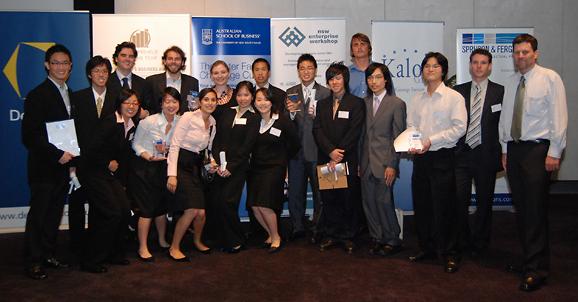 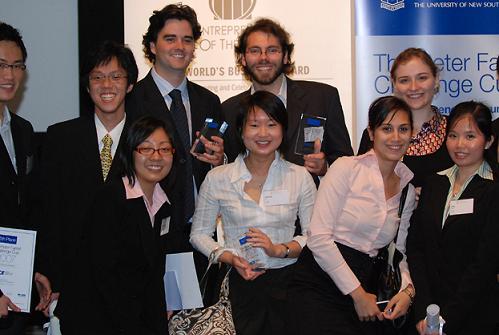
Launch of the Graduate Certificate in Research Management and Commercialisation
The year also marked the launch of the new UNSW postgraduate program, the Graduate Certificate in Research Management and Commercialisation (GCRMC). Seventeen current PhD students were funded by the Federal Government’s new Commercialisation Training Scheme (CTS) to undertake their first subject in Semester 2, 2007.
The CTS (and the Graduate Certificate) was set up to provide quality commercialisation training to the next generation of Australian research scientists and engineers. It has been designed to equip students with the skills, knowledge and experience necessary to successfully bring research-based ideas to market.
These students are expected to graduate from the program half way through 2009. Another 22 UNSW PhD students are commencing the GCRMC program in 2008.
For more information on the CTS and GCRMC program, visit http://www.grs.unsw.edu.au/scholarships/ctsinfo.html.
11
January 2007
Australian Chief Scientist addresses UNSW Diploma students
Thursday December 14, 2006: Dr Jim Peacock, the Australian Chief
Scientist talked to UNSW’s Diploma in Innovation Management
students and alumni. UNSW PhD students in Engineering and Science
PhD students were also invited.
Dr Peacock was introduced by Prof Mike Archer in his well renowned,
entertaining, and engaging style.
Dr Peacock, a highly acclaimed molecular biologist, talked about
his experiences in the commercialisation of the scientific outcomes
of his research activities at CSIRO. He helped cotton to become
Australia’s first biotechnology-based crop, established the
GrainGene initiative and the HRZ Wheat Company to develop new wheat
varieties, and founded the biotechnology company Gene Shears P/L.
These initiatives have all been highly successful commercially in
Australia and overseas. Dr Peacock explained how his discoveries
are both enhancing the sustainability of Australian and international
agriculture and generating substantial income from licensing agreements.
This income funds current and developing research activities in
CSIRO.
Dr Peacock’s key messages to the audience were;
• partner with industry and partner early
• industry-focused research is as prestigious and relevant
as fundamental science.
• it is not unreasonable for Australia to expect scientists
to consider how their research outcomes can be of benefit to Australian
society
• commercialisation is not all about the money; it is about
making a difference
At the completion of his formal presentation, Dr Peacock fielded
questions from the audience. When asked about patenting, Dr Peacock
commented that he felt that developing nations should be given the
right to use some patented technologies within their own borders
without the burden of crippling license fees.
Following the session, Prof Les Field (DVC Research) hosted an
afternoon tea for Dr Peacock to meet UNSW staff members including,
Prof Alec Cameron (Dean, Business) and Prof Margaret Harding (Dean,
Graduate Research).
For more information on Dr Peacock’s career and his current
role as Australian Chief Scientist, please visit the following websites.
http://www.chiefscientist.dest.gov.au/
http://www.csiro.au/csiro/content/standard/ps1bg.html
Contact: Dr Wallace Bridge, Entrepreneurs in Science Unit: 02 9385
1297
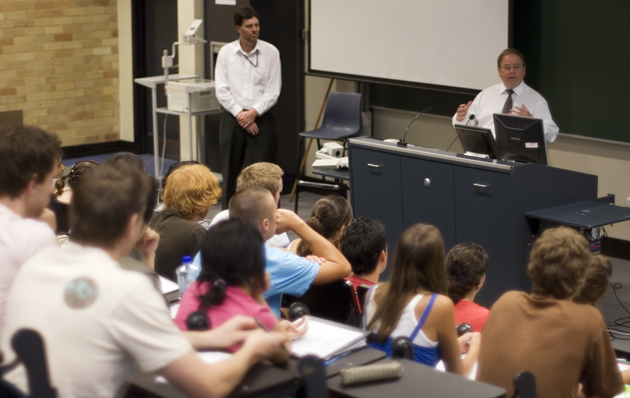
18
December 2006
Practise what you preach
Dr Wallace Bridge believes that if you are to teach commercialisation
and entrepreneurship you should really practise what you teach because
practise shows you what to teach.
After nine years in development, Dr Bridge and his former student,
Dr Martin Zarka have established a new chemical and enzymatic process
for manufacturing GGC, a precursor for the body’s “master
antioxidant” glutathione.
Glutathione is the body's key defence for detoxifying harmful compounds
implicated in cancer, diabetes, aging and other diseases and degenerative
conditions.
GGC can readily penetrate into the cell where it is converted to
glutathione. Administering glutathione, rather than GGC, is relatively
ineffective as glutathione is not taken up by cells.
GGC has long been recognised as having broad ranging potential
health benefits. This natural compound has until now proven difficult
to manufacture economically.
Natural dietary sources of GGC are available, including milk whey
protein and garlic. However, GGC is present only in relatively dilute
concentrations. This new, pure GGC product will potentially allow
for more efficacious dosages and product formulations.
It is expected that GGC will be brought to market, as early as
late 2007, as an active ingredient for use in foods, health care,
toothpastes, dietary supplements and cosmetics.
One of the first GGC products will be a skin repair anti-aging
cream. According to Dr Bridge, there is no shortage of volunteers
from family, friends and colleagues to assist in the product testing,
particularly among the older ones!
The GGC manufacturing process has been licensed to a local pharmaceutical
company, Biospecialties Australia P/L, which received an AusIndustry
Commercial Ready grant from the Federal government for $1.1M in
May 2006. The grant will assist with the industrial scale up.
The first phase of the GGC commercialisation involved the building
of a pilot production facility at the company’s Mayfield factory,
near Newcastle. The pilot phase of the GGC commercialisation will
provide engineering details for scaling up the manufacturing process.
In addition, the GGC produced in the facility will be tested for
functionality, formulation specifications, and regulatory approval.
On Tuesday 12 December 2006, the Biospecialties Australia pilot
plant was officially commissioned and welcomed to the Hunter region
by The Hon. Bob Baldwin MP, the Federal Parliamentary Secretary
for Industry, Tourism and Resources.
The rapidly increasing interest in glutathione makes it likely
that a pure GGC supplement would have significant market potential.
For example, the dietary supplement market in Australia is currently
worth $1bn and generates exports of $200m.
Biospecialties Australia P/L is a licensee of New South Innovations
(NSi), which provides technology transfer services to the University
of New South Wales.
Glutathione - fast facts
Glutathione is an antioxidant that protects cells from toxins such
as free radicals. As individuals grow older, glutathione levels
drop, and the ability to detoxify free radicals decreases. A deficiency
of glutathione is first noticed in the nervous system with a lack
of co-ordination, tremors, mental disorders, and body balance, all
caused by lesions in the brain. There is a direct correlation with
the speed of aging and the reduction of glutathione concentrations
in intracellular fluids.
Contact: Dr Wallace Bridge, Entrepreneurs in Science Unit: 02 9385
1297
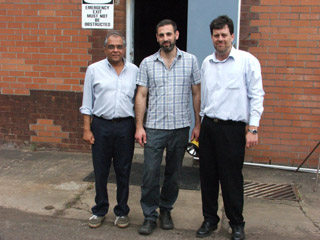
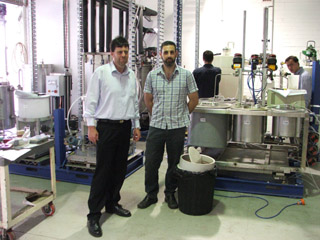
Left: Rajan Shah (CEO Biospecialties Australia), Martin Zarka, Wallace
Bridge (photo taken outside the door of the pilot plan); Right:
Chromatography - recently constructed equipment for GGC synthesis
process
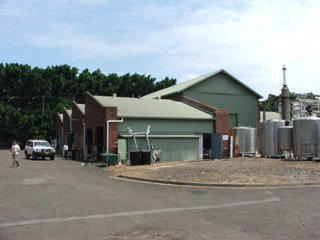
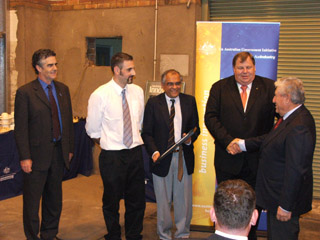
Left: Pilot plant - photo of pilot plant building; Right: Ceremonial
opening of the pilot plant - Graham Baker (AusIndustry, Hunter Regional
Manager), Martin Zarka, Rajan Shah, Bob Baldwin, Vince Baldini (owner
BSA) (L to R)
8
December 2006
New body armour gives Diploma students the edge to defeat AGSM
and MGSM students in the 2006 Peter Farrell Challenge Cup
Diploma in Innovation Management students have gone and done it
again by winning the AGSM’s annual Business Planning Competition
for the 4th year in a row.And that’s not all! They also claimed
second prize for the 5th consecutive year … and for a bit
of icing on the cake they also claimed 5th place – all with
cash prizes totalling $8,000.
This year’s competition was sponsored by Dr Peter Farrell
of Resmed fame, and was aptly named the Peter C Farrell Challenge
Cup. Other sponsors included the Kalori Group, AusIndustry, Ernst
& Young, and Deacons. The competition was coordinated by AGSM
ICE President Paul Mazlin and Christopher Witt of the Kalori Group.
Nearly 40 business plans were submitted to the competition from
UNSW and other Sydney metropolitan universities. The business plans
were screened by AGSM academic Kevin Clarke, who selected the eight
finalists.
Eight teams of UNSW Diploma and Biotechnology students taking
the course BIOT3091 “Professional Issues in Biotechnology”
submitted plans to the competition, of which four made the finals.
Other finalists included MBA student teams from the MGSM (three)
and the AGSM (one).
The judging panel included Prof Alec Cameron (Dean, Faculty of
Business), Christopher Witt (Principal, Kalori Group), Gary Zamel
(Mine Site Technologies), and Paul Cave (Bridge Climb, 2001 Australian
Entrepreneur of the Year). The finals were held on the evening of
Thursday 23 November in the UNSW Scientia. Each team had ten minutes
to pitch their business opportunities and withstand five minutes
of questions from the judges.
Following the pitches, the finalists and sponsors were treated
to a sumptuous dinner, during which Dr Michael Hallett (friend of
Peter Farrell), Alec Cameron, Chris Witt, Lisa Peterson (AusIndustry,
NSW State Manager) and Gary Zamel, gave inspiring talks on the role
and need for entrepreneurship. Peter Farrell, though unable to attend
the finals, delivered a pre-recorded 15 minute talk to the audience
describing his journey of entrepreneurship and his belief that more
Australian technologists need to live the dream of commercialisation
and innovation.
First place winners were the Comtech team consisting of Diploma
students, Danniel Jacques, Brian Tse, Ji Eun Yi and Farnaz Omidi
(absent). They received $5,000 in cash, tickets to the Ernst &
Young Entrepreneur of the Year dinner, and free professional business
consultation (Deacons and Kalori Consulting).
Comtech’s plan was written for the company, Liquid Ceramics
Technology International Pty Ltd (LCTI). LCTI has developed a radio
frequency based technology to effectively melt refractive oxides.
Refractive oxides can insulate against high temperatures and electricity,
and have extremely high levels of hardness.
Comtech’s product based business model targeted the use the
technology to manufacture personal body armour plates for use in
bullet proof vests.
LCTI had recently been granted an AusIndustry COMET grant to assist
the preparation of their business plan. Peter Milla, a COMET consultant,
thought it would be worthwhile for the students to explore alternative
business strategy options for the company – it would seem
he was right!
Dr Wallace Bridge was delighted when Comtech was announced the
winner, “They are all bioscience students, yet they wrote
and defended a winning business plan which was based on materials
science and engineering based technology – it just gives me
more evidence supporting how we teach the Diploma is hitting the
spot”.
The second placed team Origo won $2,500 and comprised Diploma
students, John Ng, Krit Hariharan, Pamela Golamco, and Jayaraman.
They scored only 2 points (out of a possible 500) less than the
Comtech team. The Origo plan was based on human embryo screening
technology developed by A/Prof Chris O’Neil of the Northern
Sydney and Central Coast Area Health Service. The technology offers
solutions for reducing the risk of multiple births in IVF patients,
and strategies for maintaining the health of embryo’s before
they are implanted.
The 3rd and 4th places went to MGSM and AGSM teams.
The 5th place of $500 went to the Biocrab team of Diploma students,
Bill Cheng and Harry Ng Chok and B.Sc (Biotech) students, Phillip
Yu and Kai Song. Their business plan was written for Aquacrabs Systems
Australia P/L (ASA). ASA has developed an aquaculture based technology
for growing hard and soft shell mud crabs to high yields and quality.
The commercialisation strategy involved exporting to the growing
and underserved Chinese markets.
The combined cash won by BIOT3091 students in the AGSM competition
since 2002 is now $48,000.
The fourth BIOT3091 finalist Adjusta P/L comprised B.Sc (Biotech)
students, Magdalena Soka, James Sung, Irving Gunawan, Vinca Angelina.
Though they didn’t place in the finals, they did an excellent
job in both the business plan and the pitch. Their opportunity,
like that of Comtech, was sourced through Peter Milla and involved
a new joint technology product for use in building construction
formwork. Again, even though they were biotechnology students they
proved themselves capable of preparing a sound business plan based
on structural engineering based technology.
Contact: Dr Wallace Bridge, Entrepreneurs in Science Unit: 02 9385
1297
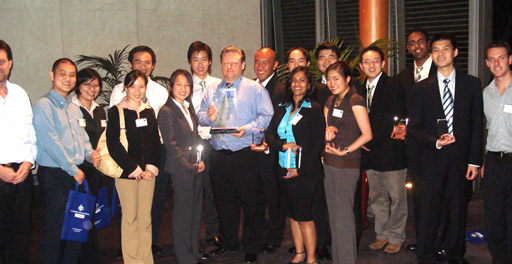
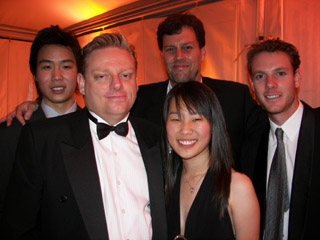 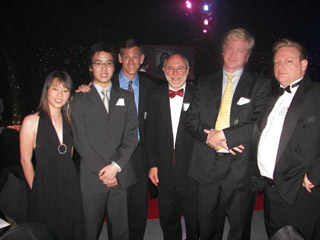
13
November 2006
UNSW’s Brillyance shines at the NSW Young Achievement Australia
Awards
UNSW’s Diploma in Innovation Management students have once
again excelled in the Young Achievement Australia’s (YAA)
business skills program.
On Friday 10th November the annual NSW YAA awards evening was
held in the Menzies Hotel. The event was hosted by Chris Taylor
(ABC’s The Chaser), and attended by over 400 students representing
57 secondary and university student run small businesses.
This year’s Diploma team, Brillyance, was nominated for seven
awards and picked up three of the most prestigious. These included
the Tertiary Business Plan of the Year, Tertiary Product of the
Year, and Priya Rao [B.Sc (Biotech)/Dip.Innov.Man] won the NSW Tertiary
Business Person of the Year.
These achievements join the Best Sales and Product Knowledge, and
Merchandising awards won by Brillyance at the annual YAA Trade Fair
held at Westfield Miranda in September. The 22 Diploma students
that made up the Brillyance team are also majoring in a variety
of scientific fields including biotechnology, nanotechnology and
medical science.
Brillyance will now go on to the National titles in all three categories
to be announced on Wednesday 29th November.
During the 24 weeks of the YAA program, students are required to
form a company, sell shares to raise initial capital, decide on
a company name and product, prepare a business plan, manufacture
and sell their products, and finally prepare an annual report, liquidate,
and distribute the capital gains to the share holders.
Headed by Managing Director Justin LaFountaine (B.Sc (Nanotech)
/Dip.Innov.Man], Brillyance based their business on something dear
to the hearts of their primary target market of their peers –
alcohol! They assembled and sold cocktail shaker kits, complete
with all the requisite components for the preparation of the perfect
cocktail or mocktail. As expected, the sets proved to be highly
popular and generated brilliant sales that allowed a 130% return
on investment to shareholders.
In commenting on the success of Brillyance, Dr Wallace Bridge,
Director of the Entrepreneurs in Science Unit, and who administers
the Diploma program stated “their success at the awards was
totally deserved, with the standout factor being their management
strategy. Each student was given responsibility for a key deliverable,
and each and every one of them delivered – they were truly
a team!”
For photographs from the YAA award’s night please visit the
Entrepreneurs in Science Website.
Contact: Dr Wallace Bridge, Entrepreneurs in Science
www.eis.unsw.edu.au
www.yaa.org.au
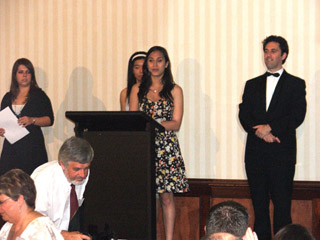
29
November 2005
Science Students Blitz Business Planning Competition, Again
Science students from UNSW sold a high-powered industry panel
on a plan to culture sea urchins for the Japanese market. They earned
$5,000 by winning. Classmates took out second and third place at
the 2005 AGSM Connector Business Planning Competition last week.
Back: Jeff Chan, Laurence Osen, Wallace Bridge,
Yulyana, Erik Wicklund, Suthikorn Kingkaew (L to R)
Front: Elaine Wat, Hang Le, Vicki Sifniotis, Enoch So, Pei Yan Liu,
Martin Simone (L to R)
The competition run by the
Australian Graduate School of Management, involves preparing and
presenting a comprehensive business plan. The judges, such as the
Dean of the AGSM, Rob McLean, have vast experience in the commercialisation
of new ideas.
This year’s winning team, ‘SeaAqua Pty. Ltd.’,
featured entrepreneurial science students, Enoch So and Vicki Sifniotis,
and MBA student, Beata Niechoda.
Second prize of $2,000 was awarded to Hang Le, Elaine Wat, Jeff
Chan, and Yulyana. Their business plan addressed the need for rapid
diagnostic tests for diseases such as bladder cancer in the global
market.
Erik Wiklund, Martin Simone, Suthikorn Kingkaew, and Pei Yan Liu
made up the third place team. Their business plan aimed at redeveloping
an existing drug into a new application for cancer treatment.
All three placegetters are Bachelor of Science or Diploma in Innovation
Management students who had recently taken the ‘Professional
Issues in Biotechnology’ course (BIOT3091). BSc and Diploma
students have now captured ten out of the twelve places in the competition
since 2002, taking home a total of over $40,000 in cash and prizes.
“Once again, the students from BIOT3091 have done a fantastic
job at thoroughly impressing the judges,” stated Dr Wallace
Bridge, Director of the Entrepreneurs in Science Unit and the BIOT3091
course coordinator.
“The fact that these teams of dedicated science students
continue to win this competition year after year really shows that,
with the right innovation and entrepreneurial mindset, scientists
can be just as competitive in the commercial world as anyone else.”
The judges of the 2005 Connector Business Planning Competition
included Rob Mclean (Dean, AGSM), Chris Witt (Partner, Kalori Group),
David Nelson (Managing Director, Divergent Capital), and Nick Humphries
(Partner, Deacons). They are all respected specialists in private
equity.
Contact: Dr Wallace Bridge, Entrepreneurs in Science Unit: 02 9385
1297
14
November 2005
Entrepreneurial Science Students Prove Themselves Unswayable
The state’s outstanding young entrepreneurial talent was
recognised at the 2005 Young Achievement Australia NSW awards evening
on Thursday 10th November at the Roundhouse, University of New South
Wales. A team of students in UNSW’s unique science entrepreneurship
program were among those honoured.
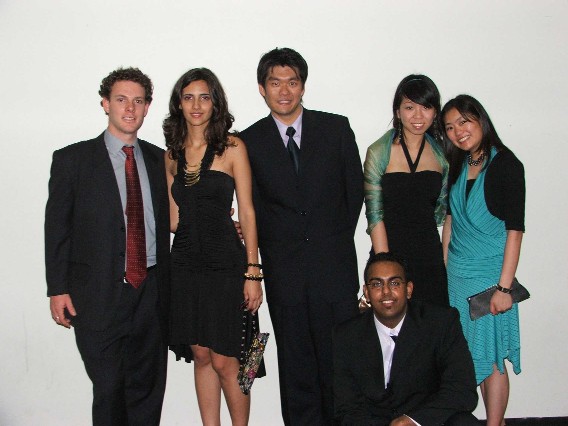
Laurence Osen (mentor), Gorjana Kisa,
Leo Lai, Julie Tran, Pamela Golmaco, Jayaraman |
Over 300 representatives from
numerous student companies around the state attended the ceremony.
The UNSW student company, Unswayable, was awarded the Baxter
Healthcare NSW Manufacturing Award for their implemention
of effective and efficient manufacturing strategies. Second
year science student and deputy director of the manufacturing
team, Leo Lai, received the award on behalf of the company.
The company consisted of 23 UNSW students undertaking the
Diploma in Innovation Management in the Faculty of Science.
|
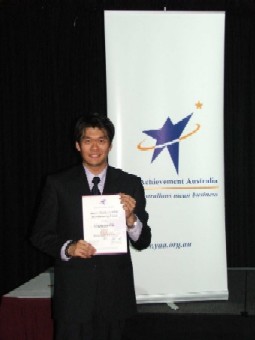
Leo Lai receiving the Manufacturing Award |
Unswayable was also a finalist for the Media
Promotions Award and the Tertiary Best Marketing Awards.
Second year science students and company members Julie Tran,
Pamela Golmaco and Leo Lai were among six finalists for the
prestigious CPA Australia NSW Tertiary Business Person of
the Year Award.
Over the past year, Unswayable successfully designed, manufactured,
marketed and sold t-shirts symbolising a sense of self-empowerment
and University pride.
Contact: Dr Wallace Bridge, Entrepreneurs in Science Unit:
02 9385 1297
|
10
December 2004
Innovative scientists win AGSM business planning competition
Science students scooped the pool at the 2004 Connector Business
Planning Competition last Friday, taking out first and equal second
place.
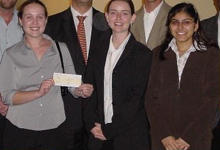
Samantha Keirs, Helen McGuire, Disha Miglani
|
Run by MBA students from the Australian Graduate School
of Management, the competition tests entrepreneurial skills
crucial for the marketing and commercialisation of new ideas.
The first and second placegetters from science were BSc/ Diploma
in Innovation Management students taking the 'Professional
Issues in Biotechnology' course (BIOT3091). |
BSc/ Dip in Innovation Management students have taken out seven of
nine winning places over the past three years of competition, winning
$30,000 in cash and prizes. This year, first place went to Disha Miglani,
Samantha Keirs and Helen McGuire.
Their business plan was written for 'Protigene P/L', a spin off 'Nucleics',
formed to house the intellectual property for Z-Tag, a novel protein
purification technology.
Team member, Disha Miglani said: "If it weren't for the diploma course
I wouldn't even be thinking along the lines of business planning and
business strategies for science technologies and innovations. It has
proven that science students can be just as competitive in business
planning as MBA students."
Second place was shared by 'Crude-X-Tech' science students and the
MBA team, 'Sentinel'. Crude-X-Tech members were Adam Goulburn, Sashi
Fernando, Prath Thillinathan and Ramesh Harichandran. They submitted
a business plan for a technology to develop a microbial solution that
removes oil sludge in petrochemical storage transport tanks.
"The BIOT teams excelled in the preparation of their Business
Plans and pitches, with eight making the finals," said Dr Wallace
Bridge, Director, Entrepreneurs in Science Unit. "The judges were
unanimously impressed with the quality of the business plans and were
amazed when they discovered that they had been prepared by undergraduate
science students. The reaction of the Protigene girls as they were
announced the winners plus the overwhelming presence of science students
and their camaraderie was a wonderful spectacle."
The 2004 Connector Business Planning Competition was sponsored by
the Federal Government's NIAS program, the AGSM and Blunt Solutions.
Contact: Dr Wallace Bridge, Entrepreneurs in Science Unit: 02-9385
1297
UNSW science media contact: Dan
Gaffney - mobile 0411 156 015.
21
May 2004
GIVING SCIENTISTS A HEAD FOR BUSINESS
The Federal Government is pressing hard for greater commercialization
of Australia's scientific discoveries, yet a long-standing complaint
among business and industry leaders has been that too few scientists
are savvy to their needs.
On Friday 14 May, 2004 the very first group of University of NSW
students [about 20] trained to tackle specifically that problem
will graduate with a new diploma - in effect, business studies tailored
for the scientist.
Many of the students have taken a combined science or engineering
degree plus the new diploma in Innovation Management (Dip. Innov.
Man.). The diploma is completely focused on issues relating to commercialisation
of scientific discovery and the specifics of high-technology based
businesses. It acts as a bridge between these two otherwise distinct
fields.
The diploma program comprises eight subjects taken over the last
two years of the students' undergraduate studies, including business
and accounting principles, project management, strategic communication
and negotiation, intellectual property management, business funding
and business planning for high-technology startups, marketing, business
and technology due diligence, government regulations and administration.
The undergraduate diploma structure is the first of its kind and
was established in 2001. Unlike other courses/programs aimed at
teaching business and entrepreneurial skills to science students
(e.g. Innovation degrees at UTS and UQ) it is not embedded within
a particular primary science program. As such, students can undertake
the diploma independent of their science study focus and because
it is an add-on to the standard science degree it does not lead
to any dilution of the students' science-based education.
Currently, students majoring in biotechnology, medical science,
biomedical engineering, nanotechnology, chemistry and food science
are enrolled in the diploma course.
Subjects are delivered by both academics and expert industry or
government professionals through a combination of highly interactive
lectures, workshops and case studies with small class sizes a priority
in order to gain maximum impact from the learning experience.
The program is not administered by UAC, with students applying
part-way through their tertiary studies. Entry into the program
is highly competitive and selection is based on a combination of
academic merit as well as demonstrated entrepreneurial flair.
As part of their studies the students take part in Young Achievement
Australia's (YAA) business skills program. In 2002, one of the UNSW
diploma students, Matthew Wright, was awarded the YAA NSW Tertiary
Business Person of the Year.
Since 2002, teams with diploma student members have won five of
the six places (and over $20,000 in prizes) on offer in the Australian
Graduate School of Management's Connector Business Planning competition.
One of this year's diploma graduates, Melissa Khoo will also receive
the University Medal for outstanding achievement over her entire
science and diploma studies.
Ten diploma students will be representing UNSW at this year's Universitas
21 (U21) Global Technology Entrepreneurship Summer School and Business
Planning competition to be held over eight days at the National
University of Singapore. The students' airfares, accommodation and
registration are being funded by UNSW through the office of the
Deputy-Vice Chancellor for International and Education, Professor
John Ingelson.
Many of this year's graduates will be continuing on with their
science career paths by undertaking PhD studies. Others have commenced
work as junior scientists in research laboratories and others are
exploring the alternative careers that have now been opened up for
them by completing the diploma, including marketing, intellectual
property management, high technology finance, and business management.
"It is well known that if Australia, or any nation for that
matter, is to have any chance of a guaranteed future of socio-economic
well being then we must do our best to become a significant player
in the new global high technology industries of biotechnology, nanotechnology,
IT and medical science," says Dr Wallace Bridge, director of
the UNSW Entrepreneurs in Science Unit.
"All of these industries are based on scientific discovery
and, as such, we need our research scientists to be business savvy.
They need to be able to recognize commercial opportunities in their
research findings, know how to protect the relevant intellectual
property and understand the pathways by which they can be turned
into profitable products or services.
"Australian governments recognize the imperative that our
future scientists need to be educated in the world of business and
the need for scientists to develop an entrepreneurial mindset. Both
the Federal government and the NSW State government have recently
published reports [Federal: Mapping Australian Science and Innovation,
October 2003; NSW State: Science and its commercialisation in New
South Wales, December 2003] that highlight the need for Australian
universities to develop business based educational programs for
tertiary science students."
CONTACTS (not for publication): UNSW Faculty of Science media contact:
Bob Beale - 02 9385 5893 or 0411 705 435
Entrepreneurs in Science Unit: Director, Dr Wallace Bridge, 02
9385 1297
12
December 2003
Science scoops pool at AGSM Business Planning Competition
Science students have scooped the pool at this year's Connector
Business Planning Competition, walking away with over $7,000 in
cash and prizes.
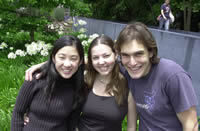
Christine Chiu, Aila Whittall, & Anthony
Weinberg |
Run by MBA students
from the Australian Graduate School of Management, the competition
tests entrepreneurial skills crucial for the marketing and
commercialisation of new ideas.
The 'Targeteq' team of Aila Whittall, Christine Chiu and
Anthony Weinberg won first prize from a field of 10 short-listed
teams who fought out the final.
Second prize went to 'Invertech' comprising of Shona Silvester,
Wendy Leung and Vera Kosic, while third prize went to 'Gamtech'
made up of Jon Chao, Joanne Tan, Melissa Simpson and Grace
Bolt. |
| |
The first three placegetters are BSc/ Diploma
in Innovation Management students taking the 'Professional
Issues in Biotechnology' course (BIOT3091).
It provides grounding in intellectual property, patents and
commercialisation issues pertinent to the booming biotech
industry.
"We couldn't believe it when we won," said Anthony Weinberg,
a third year environmental science student majoring in biology.
"We're relatively new to the idea of business planning but
I guess we're just fast learners who had good training," he
said.
Targeteq's winning business plan concerns a smart protein
that delivers a degrading enzyme to cholesterol sites in the
body.
Like all finalists, the team submitted a detailed business
plan before they were given a six-minute grilling by the competition
judges.
Other science students to make the finals were Alfred Wong,
Donald Lao, Yohan Rahmanto, Keith Chow, Joe Codamo, Ee-Ling
Fock, Linda Ly and Jean Hsu.
Media contact: Dan Gaffney - mobile 0411 156 015 |
|

